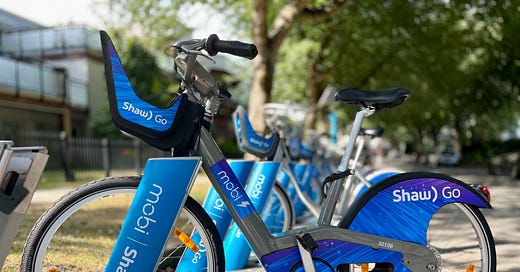Fix Biking 6: Bike Share is Awesome. Just Don’t Expect it to Run at a Profit.
Think of it as a part of your city’s transit system.
This is the sixth in a series of common sense solutions for building a better city for biking.
When bike share first came out, we have to be honest and say we didn’t really get it. Don’t most people who cycle already have their own bike?
Now, with a little more experience using bike share systems in various cities, we’re big fans. Huge fans.
Why we love bike share
We see five benefits to bike share, even for those who ride their own bikes or don’t ride at all.
1. Safety in numbers
The more bikes on the street, the safer cyclists feel. Bike share creates a critical mass of cyclists that creates the safety in numbers. One study found that bike share increases bike commuting by about 20%.
2. Last mile connection to transit
Transit and bike share should be best mates. Bike share can be the last mile connection from a transit station to a final destination. In fact, bike share really should be an extension of the transit network. Same payment system, bikes near stations.
3. Great for tourists
For cities with decent bike infrastructure, is there any better way to see a new place than by bike?
4. Gateway to ebikes
You’ve heard us talk before about the magic of ebikes, and the importance of making opportunities for people to try them out. Electric bikes are becoming pretty common in most bike share systems now. So we see bike share as the gateway to helping people try out ebikes and see what a transformative technology they are. It only takes one ride to begin to understand how ebikes can reshape our transportation systems.
5. More bikes means less cars on the road
Cities in Canada are growing, so what’s the plan to deal with all those additional trips? We don’t have room on our streets for more cars, and so we need to find ways to get more people to take more trips by transit and bikes. Hello bike share!
But they are not a profit centre
Public transit almost never runs at a profit. And why should it? Transit is a public good. It keeps our roads from becoming overcrowded and provides options to those who may not want or be able to drive a car.
It’s the exact same for bike share.
But bike share, it turns out, costs a little more than people are willing to pay for a short ride. Some big cities that have high density and that can attract big corporate sponsors may be able to break even, but most municipalities will need to subsidize bike share.
And that’s fine
Bike share should be treated like a public service, and funded the way we fund other public goods.
We don’t expect emergency services, municipal swimming pools or flu vaccines to make a profit. But they do serve an important public role — and that is why we fund them.
We need to start thinking about bike share in the same way.
P.S. we are always happy to hear from readers, but will be unable to respond to any messages until mid-December.







It's also great for people who live in small spaces and may not have adequate or safe storage for bikes. Doubly so in the winter for all of those who bring bikes into their living spaces in the less mucky parts of the year.